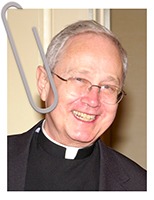I never gave much thought to what is involved when I hear or ask the question, “Don’t you understand?”
Sometimes in frustration, I have said, “Don’t you understand”? After all, it was so obvious to me!
Other times, with perhaps deeper frustration, I have felt, “You don’t understand (me)?”
When I thought about it, I realized… “It’s complicated!” There are many ways and levels of understanding.
What are you doing?
In 1671, Christopher Wren supposedly observed three bricklayers on a scaffold, one crouched, one half-standing, and one standing tall. All were working very hard and fast. He asked them each the same question “What are you doing?” Each answered accurately… yet differently. In the back of their minds, they may have thought, “Don’t you understand what you see!”
The first bricklayer said, “I’m a bricklayer. I’m working hard laying bricks to feed my family.”
The second bricklayer responded, “I’m a builder. I’m building a wall.”
But the third bricklayer, perhaps with a gleam in his eye, announced, “I’m a cathedral builder. I’m building a great cathedral to The Almighty.”
For the first bricklayer, building the wall was a job. For the second bricklayer, it was an occupation. For the third bricklayer, it was a calling.
All three answers were true… But the third person saw a much bigger picture.
Understanding your bigger picture
I thought of the above centuries-old story as I read Pope Francis’ explanation of the Pentecostal gift of God‘s spirit of understanding.
But to understand a situation in depth, as God understands it, is the effect of this gift. And Jesus desired to send us the Holy Spirit so that we might have this gift, so that all of us might understand things as God understands them, with the mind of God.
What a beautiful gift the Lord has given us. It is the gift with which the Holy Spirit introduces us into intimacy with God and makes us sharers in the plan of love which he has for us.
Pope Francis reminds us
Jesus himself told his disciples: I will send you the Holy Spirit and he will enable you to understand all that I have taught you.
To understand the teachings of Jesus, to understand his Word, to understand the Gospel, to understand the Word of God.
One can read the Gospel and understand something, but if we read the Gospel with this gift of the Holy Spirit, we can understand the depths of God’s words.
Pope Francis give us an example
There is an episode in the Gospel of Luke which aptly expresses the depths and power of this gift.
After witnessing the death on the Cross and burial of Jesus, two of his disciples, disappointed and grief stricken, leave Jerusalem and return to their village called Emmaus. As they are on their way, the risen Jesus draws near and begins talking with them, but their eyes, veiled with sadness and despair, are unable to recognize him.
Jesus walks with them, but they are so sad, in such deep despair, that they do not recognize him.
When, however, the Lord explains the Scriptures to them so that they might understand that he had to suffer and die in order then to rise again, their minds are opened and hope is rekindled in their hearts (cf. Lk 24:13-27).
Wisdom is to see all of the things God sees.
Understanding speaks of how much of the picture we see and understand.


When I re-read Luke’s passage, it was as I had remembered, namely, that the disciples on the road didn’t recognize Jesus until he broke bread with them and said the blessing. Then, they understood all that he had been saying about the Scriptures. It’s probably just an interesting quirk in the Gospel story, but recognition seems to be a big part of understanding, as in your example also.
When the whole experience is revealed, the individual parts, even the very thought process that began it all, becomes clearer and more easily understood.
A former boss used to remind us that when you see what resembles a garden area but looks empty now, don’t be so quick to plow it under. In her example, strawberry bushes had grown there and disappeared over the winter season. In the spring, they would return and produce abundant fruit. Having the longer view seems to be a key to understanding/appreciating what is before our eyes.
I have gotten into a habit of reading quotations online without examining who the author might be. Then, when the author’s name appears at the end of the quote, I form an opinion as to whether it enhances my understanding of that person and/or the issue, or whether it merely gives me a different insight into the person who wrote it.
I guess understanding takes much longer than I would have hoped. It’s neither magical nor mysterious (and some would say not very efficient), but it certainly is appreciated.